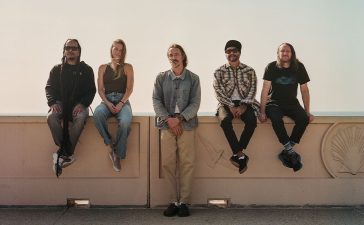To say that APATE’s latest record is about one thing in particular would be a misnomer. Indeed, it’s rare that any entire body of work is about a singular topic. Themes of life, loss, and the slings of arrows one must face to cope are sewn throughout the tracklisting. “The name Rage stems from the feeling of having this pent up frustration and anger towards the situation that you’re stuck in,” the band explain.
It’s deep within the folds of Rage that you’ll find ‘Gasoline Anthem’ and ‘Liar’s Tongue’; two songs that openly and honestly address seismic events that happened in the life of vocal duo Zakk Ludwig and Caleb Patch, and it was in speaking with the pair that BLUNT would learn that, for all intents and purposes, trauma lays at the heart of Rage.
“It was just like everything coming out at once,” Ludwig narrates. “It was pretty stressful for me personally.” For the first time in either musician’s career, the writing process took the form of a therapy session, digging deep into the well of their lived experiences. “I remember Zakk being very stressed about it,” Patch adds. “We both definitely decided it was the right direction. For me, I was both stressed and relieved about it – because I’d hidden it all for so long from everyone, finally being able to get it out there, what I’d been through, so that hopefully people could understand why I maybe wasn’t myself for a long period of time.”
This isn’t to say that APATE phoned it in with their previous outing, 2017’s Spit You Out. But where they focused in on the collective human experience, for Rage, the point was to find and speak to the individual human experience. “You can hear a noticeable difference,” Caleb confirms, “When it’s something that you’re passionate about, that you’re yelling about.”
Ludwig and Patch experienced different forms of trauma. One drew from his experiences growing up, the other from a situation that would bowl him over later in life. But to focus on the differences in trauma is counterproductive; pain is pain. What’s remarkable is that despite the limitless forms that trauma can take on, there is a one size fits all remedy – talking about it. Both vocalists pinpoint that the moment that honest and purposeful discussion took place around their personal trauma was simultaneous with a feeling that a tangible weight had been lifted off their shoulders.
“As soon as we started laying down tracks, Zakk’s voice was in peak condition,” Caleb recalls. “He was going off because he’s just so passionate about it. That, hearing those tracks getting laid down, was the moment for me.”
“I gave it my all in the booth because a lot of the things that we spoke about on the album are personal to us,” Zakk interjects. “So I can feel those emotions and it’s a way of healing in that sense, just getting that out and really expressing how that makes me feel deep inside, through vocals. I know it’s kind of weird, but it does help.”
Though the composition process of Rage may have been focused on the individual human experience, once tracked, focus soon turned back to the collective one. Both Ludwig and Patch had experienced considerable catharsis from addressing their trauma head-on and watching the other do so. The intention soon turned to how they could impart that sense of healing to their listeners.
Caleb explains their goal to export healing: “If there’s ever a point where you’re listening to an artist and you feel like their lyrics are speaking directly to you, it makes you feel like you’re not alone, and it makes you feel like there are other people experiencing the same thing as you, at the same time almost. You don’t feel alone in your situation, or your own pain.”
Indeed, it’s the places we fear the most that connect us all. Despite our best intentions to only ever focus on the positives, it’s the bad times that we can all understand. And even though there’s scientific proof that the basic function of talking and being listened to can equate to boundless positive results, Ludwig and Patch take issue with the sheer lack of dialogue that remains around personal trauma.
“I think a lot of the stuff to do with trauma is pushed aside,” Caleb asserts. “A lot of people don’t want to speak their minds on trauma and what’s happened to them. I think people do need to be a bit more open. Especially trauma in men. A lot of men don’t speak about things. Men need to speak up, man. There’s nothing wrong with a dude speaking up about how he feels.”
Not too long ago we discussed grief, and how the only wrong way to process it was to do nothing. There’s a strong takeaway from APATE’s Rage in that there’s a similar cure-all for trauma, too – purposeful and vulnerable discussion. This of course becomes difficult when the dialogue is so sparse. Perhaps it’ll take Rage, and the blistering, brutal soundscapes within, to blast some life back into the discussion.







